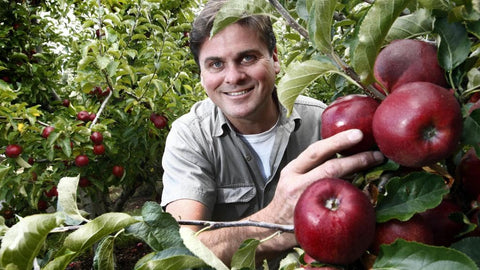Media
Rubigold Apples Tasmania
What's in the news
Rubigold apples sets the Griggs family of Huonville in Tasmania in good stead
THE only place in the world Rubigold apples can be found is on the Griggs’ 120ha family farm at Huonville in Tasmania.
So you’d think the discovery of the new variety — with its ruby red skin and golden flesh — in 1997 would be like winning the lottery. Unfortunately, said Dane Griggs, it wasn’t as simple as that.
“You think ‘great, we’ve found an apple; we own an apple that isn’t found anywhere else,’” said Dane, who works with brother Brett on the sixth-generation apple growing business, BW Griggs. “But with the discovery comes responsibility.”
After the family found the bud mutation, or sport (a common find in an apple orchard), it took them several years of grafting and testing to ensure it was indeed a great apple not found anywhere else.
They approached The Australian Pome Fruit Improvement Program’s intellectual property manager for advice on trademarking it as rubigold and obtaining Plant Breeder’s Rights.
To own a new variety, a proposed plant must demonstrate “distinctness, uniformity and stability.”
HARD YARDSONCE these hurdles were crossed, the real work began. “The discovery of rubigold is a blessing in that you’ve got control of a product and you’re a price maker to a point,” said Dane, 49, who is manager of BW Griggs’ packing shed and marketing.
“It’s not like selling something mainstream like a fuji where you’re a price taker and you’re competing with everyone else.” After selling their first Rubigolds domestically in 2009, they broke the export market in 2014.
This year they will export to China, Hong Kong, Taiwan and possibly Vietnam, with a trip to Kuwait and Dubai planned to expand markets.
Last year out of 520 tonnes of Rubigolds, the Griggs exported 120 tonnes. This year’s export is set to be 150 tonnes.
GROW FOR ITBW Griggs has 50ha of orchards on four properties in the Huon Valley, with a total yield of 3500 400kg bins, or 1400 tonnes. Brett is the manager of production and harvest, with conventional growing methods tailored to their four sites.
One farm, for instance, has clay soils on a hill where it’s easier to graft new budwood to existing root structures. Their property that has sandy flat soil uses more modern methods of grafting on trellis using dwarf stock.
About 40 per cent of the harvest is rubigold, followed by gala, fuji, pink lady and small amounts of red delicious (which have fallen in popularity) and a tiny production of golden delicious. They have also begun growing the Montague-owned variety envy.
Dane said his father, Kevin, first began exports of red delicious to the UK and Europe in the 1950s then Sri Lanka, India and South East Asia in the ‘70s and ‘80s.
In addition, BW Griggs produces 35 tonnes of cherries every year. For the past three years about 95 per cent of cherries have been exported, which is how they made their initial contacts to export rubigold.
SHE’LL BE APPLESWhen Rubigold first became commercial they sold domestically to wholesale markets in Brisbane, Melbourne, Sydney and Adelaide. Perth has shown interest this year.
“Some of those guys supply independent chains like Aldi and IGA,” Dane said
“For them it’s something the majors don’t have — a point of difference for the smaller chains.”
He said he broke into export markets for Rubigold through their initial exporter contacts, but now mainly exported directly.
Dane has since travelled to Asia to grow his contacts, finding the annual Asia Fruit Logistica expo in Hong Kong to be one of the most useful events.
“I think we have crossed the major hurdles and we’ve started to see momentum grow,” he said. “Word of mouth has started and people are coming to us. We’re finally at a point of not having to chase people. “They are now approaching me.”
MATCH POINTDane said one of the biggest export selling points was Tasmania’s status as a fruit fly free zone. “Tasmania is the only state in Australia allowed in to China because we’re fruit fly free,” he said. “That meant last year we were the biggest exporter of Australian apples into China, because we’re one of the only ones doing it.”
Dane said sizing had also been a point of difference in marketing. Domestic markets take small to medium size apples of about 160-180g, while export takes apples of about 272g.
Rubigolds are sent to Hong Kong and Taiwan via airfreight and to China by sea. “The costs are higher with air, but it’s what I prefer because of the quality of fruit on arrival.
“When you find a new market you don’t want big volumes going on sea freight initially until you have an established customer base.”
The Weekly Times March 2016
